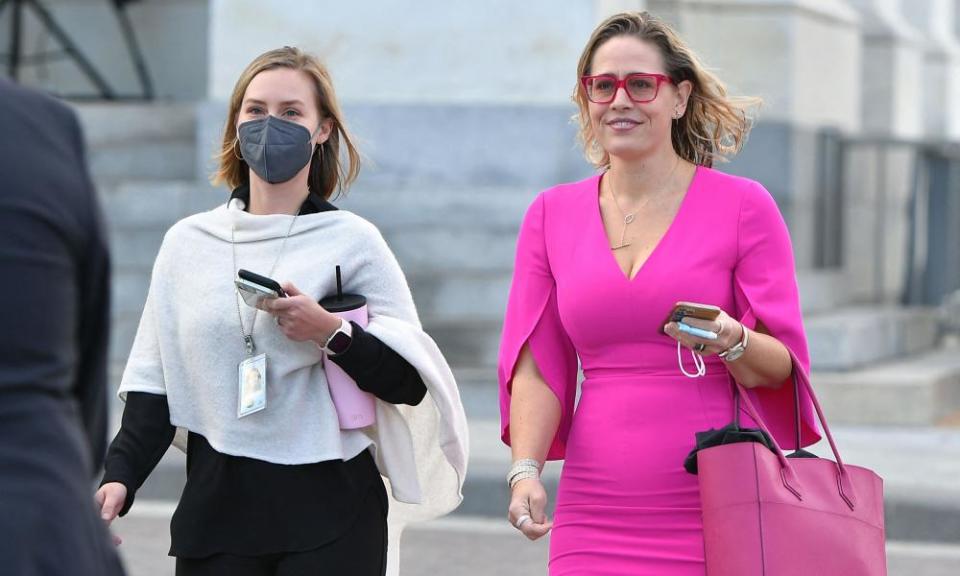Kyrsten Sinema: Arizona Democrats censure senator for voting rights failure

Democrat opposed move to carve voting rights issues out of filibuster and thereby overcome GOP opposition
The Arizona Democratic party has formally censured Kyrsten Sinema, the US senator whose opposition to filibuster reform helped sink attempts to protect voting rights.
Related: The three lessons for the voting rights struggle from the latest Senate setback | Steve Phillips
In a statement on Saturday the Arizona party chair, Raquel Terán, said: “While we take no pleasure in this announcement, the ADP executive board has decided to formally censure Senator Sinema as a result of her failure to do whatever it takes to ensure the health of our democracy.”
The attempt to pass voting rights legislation died in the Senate this week, a huge blow to Joe Biden and his party in a year which finishes with midterm elections in which Republicans are expected to prosper.
Sinema supported two bills but they were blocked by Republicans after hours of emotional and at times deeply personal debate over voting rights, racism and the fragility of American democracy.
Republicans were able to block the bills because Sinema and another moderate Democrat, Joe Manchin of West Virginia, opposed a move to carve voting rights issues out of the filibuster, the Senate rule by which most legislation requires 60 votes to progress.
Saying she opposed reform because the filibuster protected the rights of the minority, Sinema said in a floor speech she was “committed to doing my part to avoid toxic political rhetoric, to build bridges, to forge common ground, and to achieve lasting results for Arizona and this country”.
Critics pointed out that no only do Republicans in the 50-50 Senate represent millions fewer Americans than Democrats, but the GOP itself was recently happy to change filibuster rules to require only a simple majority to confirm supreme court justices.
Donald Trump was therefore able to nominate three hardline conservatives to a court which had already gutted federal voting rights protections.
Since that supreme court decision, in 2013, and at a growing pace since Trump refused to concede defeat in 2020, Republican state governments have passed laws which critics say are meant to make it harder for communities which lean Democratic, particularly Black voters, to cast their ballots.
Mitch McConnell, the Senate Republican leader, stoked uproar this week when, after the failure of the Democratic voting rights push, he said: “The concern is misplaced, because if you look at the statistics, African American voters are voting in just as high a percentage as Americans.”
Diana DeGette, a Democratic representative from Colorado, said: “African American voters ARE AMERICANS and to suggest otherwise is about as racist as it gets.”
Other Republican measures, critics say, will make it easier for the GOP to overturn results.
In her statement on Saturday, Terán said: “The Arizona Democratic party is a diverse coalition with plenty of room for policy disagreements.
“However, on the matter of the filibuster and the urgency to protect voting rights, we have been crystal clear in the choice between an archaic legislative norm and protecting Arizonans rights to vote. We choose the latter and we always will.”
Terán praised Sinema’s role in passing Covid relief and a bipartisan infrastructure bill, key parts of Biden’s agenda. But she also highlighted Republican attempts to audit and overturn Trump’s defeat in Arizona and election laws being passed nationwide.
“The ramifications of failing to pass federal legislation that protects [the] right to vote are too large and far reaching,” she said.
A spokeswoman for Sinema said: “During three terms in the US House, and now in the Senate, Kyrsten has always promised Arizonans she would be an independent voice for the state – not for either political party. She’s delivered for Arizonans and has always been honest about where she stands.”
Nonetheless, the senator has suffered significant blowback.
Bernie Sanders, the Vermont senator and leading progressive, said this week he could back primary challengers to Manchin and Sinema in 2024. Sinema also saw Emily’s List, a powerful abortion rights group, withhold its endorsement.
In a statement, Emily’s List president Laphonza Butler said: “We believe the decision by Senator Sinema is not only a blow to voting rights and our electoral system but also to the work of all the partners who supported her victory and her constituents who tried to communicate the importance of this bill.”
A Democratic fundraising juggernaut, Emily’s List was Sinema’s top political donor in her 2018 Senate race, according to opensecrets.org.
Another abortion rights group, Naral Pro-Choice America, said it would only endorse senators “who support changing the Senate rules to pass the critical legislation that will protect voting rights”.
Related: Who is Kyrsten Sinema? Friends and foes ponder an Arizona Senate enigma
Arizona’s other Democratic senator, Mark Kelly, was on Saturday fundraising off his decision to support filibuster reform on voting rights matters, which he said was “a tough one – but [the] right one for Arizona and our country”.
The effects of censure by a state party are debatable. In Arizona, the Republican John McCain was censured in 2014 for what his state party deemed too liberal a voting record. The senator and 2008 presidential nominee took it in his stride, as part of his public image as a political maverick.
Sinema won the Arizona Senate seat vacated by Jeff Flake, an anti-Trump conservative, and also presents herself as unbound by traditional political codes.
Last year, Chuck Coughlin, a former Republican operative in the state, told the Guardian Sinema was a “pragmatist” who “understands that if she is to succeed in Arizona, she must succeed in this lane”.
However, Saundra Cole, a Democrat who once campaigned for Sinema, said: “She’s not John McCain. She’s not a maverick. I didn’t agree with him on many things but at least we knew where he stood.”

 Yahoo Movies
Yahoo Movies 